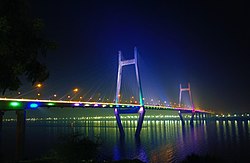Prayagraj district, formerly known as Allahabad district,[2] is the most populous district in the Indian state of Uttar Pradesh. Prayagraj city is the district headquarters of this district. The District is divided into blocks within tehsils. As of 2011, there are 20 blocks in eight tehsils.[3][4][5] The Prayagraj division includes the districts of Pratapgarh, Fatehpur, Kaushambi and Prayagraj, with some western parts that had previously part of Allahabad District becoming part of the new Kaushambi District.[6] The administrative divisions are Phulpur, Koraon, Meja, Sadar, Soraon, Handia, Bara, Shringverpur and Karchana.
Prayagraj district
Sangam Nagri Allahabad district | |
|---|---|
Clockwise from top-left: Triveni Sangam, Tomb of Nihar Begum at Khusro Bagh, Anand Bhavan, New Yamuna Bridge, Bara Thermal Power Station | |
 Location of Prayagraj district in Uttar Pradesh | |
| Country | |
| State | Uttar Pradesh |
| Division | Prayagraj |
| Headquarters | Prayagraj |
| Tehsils | 8 |
| Government | |
| • Divisional Commissioner | Sanjay Goyal IAS[1] |
| • District Magistrate | Sanjay Khatri IAS |
| Area | |
• Total | 5,482 km2 (2,117 sq mi) |
| Population (2011) | |
• Total | 5,954,391 |
| • Density | 1,100/km2 (3,000/sq mi) |
| Demographics | |
| • Literacy | 74.41% |
| • Sex ratio | 901 |
| Time zone | UTC+05:30 (IST) |
| Vehicle registration | UP 70 |
| Major highways | NH 19 |
| Lok Sabha constituencies | Allahabad Phulpur |
| Website | prayagraj |
The three rivers of India - Ganges, Yamuna and the mythical river of Sarasvati - meet at a point in the district, known as Triveni Sangam, considered holy by Hindus. Prayagraj is one of the largest educational hubs.
Demographics
edit| Year | Pop. | ±% p.a. |
|---|---|---|
| 1901 | 1,141,944 | — |
| 1911 | 1,124,143 | −0.16% |
| 1921 | 1,076,120 | −0.44% |
| 1931 | 1,142,845 | +0.60% |
| 1941 | 1,388,068 | +1.96% |
| 1951 | 1,568,592 | +1.23% |
| 1961 | 1,882,506 | +1.84% |
| 1971 | 2,292,284 | +1.99% |
| 1981 | 2,983,245 | +2.67% |
| 1991 | 3,899,660 | +2.71% |
| 2001 | 4,937,266 | +2.39% |
| 2011 | 5,954,391 | +1.89% |
| source:[7] | ||
According to the 2011 Census of India the district has a population of 5,954,391.[7] This gives it a ranking of 13th in India (out of a total of 640).[7] As of 2011 it is the most populous district of Uttar Pradesh (out of 71).[7] The district has a population density of 1,087 inhabitants per square kilometre (2,820/sq mi).[7] Its population growth rate over the decade 2001-2011 was 20.74%.[7]
The district has a sex ratio of 902 females for every 1000 males,[7] and a literacy rate of 74.41%, highest in the region[8] and close to the all-India average of 74%. 24.75% of the population lives in urban areas. Scheduled Castes made up 22.00% of the population.[7]
Religion
editHinduism is majority religion in the district with 85.69% followers. Islam is second most popular religion in district of Prayagraj with approximately 13.38% following it. Around 0.93% stated 'Other Religion', approximately 0.51% stated 'No Particular Religion'. Small numbers of Christians live in the district.[9]
The Prayag Kumbh Mela is a major Hindu event. Prayagraj has a Triveni Sangam. Akshayavat is a sacred fig tree. There is a Roman Catholic Diocese of Allahabad.
Languages
editAt the time of the 2011 Census of India, 94.91% of the population in the district spoke Hindi (or a variant of Hindi), 2.69% Urdu and 1.86% Awadhi as their first language.[10]
People in the district speak Awadhi, a language in the Hindi continuum spoken by over 4 million people, mainly in the Awadh region;[11] and Bagheli, which has a lexical similarity of 72-91% with Hindi and is spoken by about 3 million people in Bagelkhand.[12]
References
edit- ^ "Shri Sanjay Goyal, IAS | District Prayagraj, Government of Uttar Pradesh | India". prayagraj.nic.in. Retrieved 25 March 2021.
- ^ "District Prayagraj, Government of Uttar Pradesh | the City of Kumbh | India". Retrieved 5 April 2020.
- ^ "Development Blocks under Tehsils". District court of Allahabad. Archived from the original on 26 May 2012. Retrieved 4 August 2012.
- ^ Hridai Ram Yadav (2009). Village Development Planning. Concept Publishing Company. pp. 9–13. ISBN 978-81-7268-187-6. Retrieved 4 August 2012.
- ^ Pramod Lata Jain (1990). Co-operative Credit in Rural India: A Study of Its Utilisation. Mittal Publications. pp. 61–63. ISBN 978-81-7099-204-2. Retrieved 4 August 2012.
- ^ "Maps, Tahsils and villages of Allahabad". Explore Allahabad Press. Archived from the original on 21 October 2014. Retrieved 12 January 2014.
- ^ a b c d e f g h "District Census Handbook: Allahabad" (PDF). censusindia.gov.in. Registrar General and Census Commissioner of India. 2011.
- ^ "Allahabad has highest literacy rate in region". The Times of India. 15 April 2011. Archived from the original on 6 May 2013. Retrieved 3 August 2012.
- ^ a b "Table C-01 Population by Religion: Uttar Pradesh". censusindia.gov.in. Registrar General and Census Commissioner of India. 2011.
- ^ a b "Table C-16 Population by Mother Tongue: Uttar Pradesh". www.censusindia.gov.in. Registrar General and Census Commissioner of India.
- ^ Awadhi at Ethnologue (25th ed., 2022)
- ^ Bagheli at Ethnologue (25th ed., 2022)




